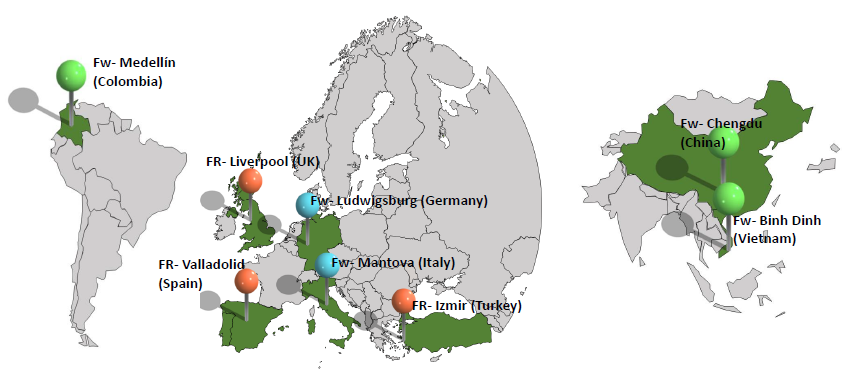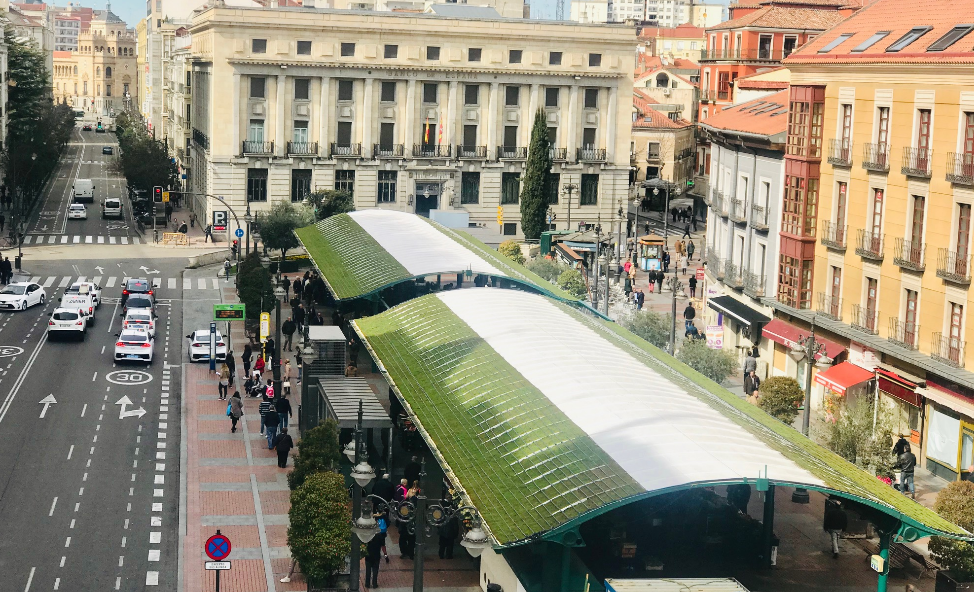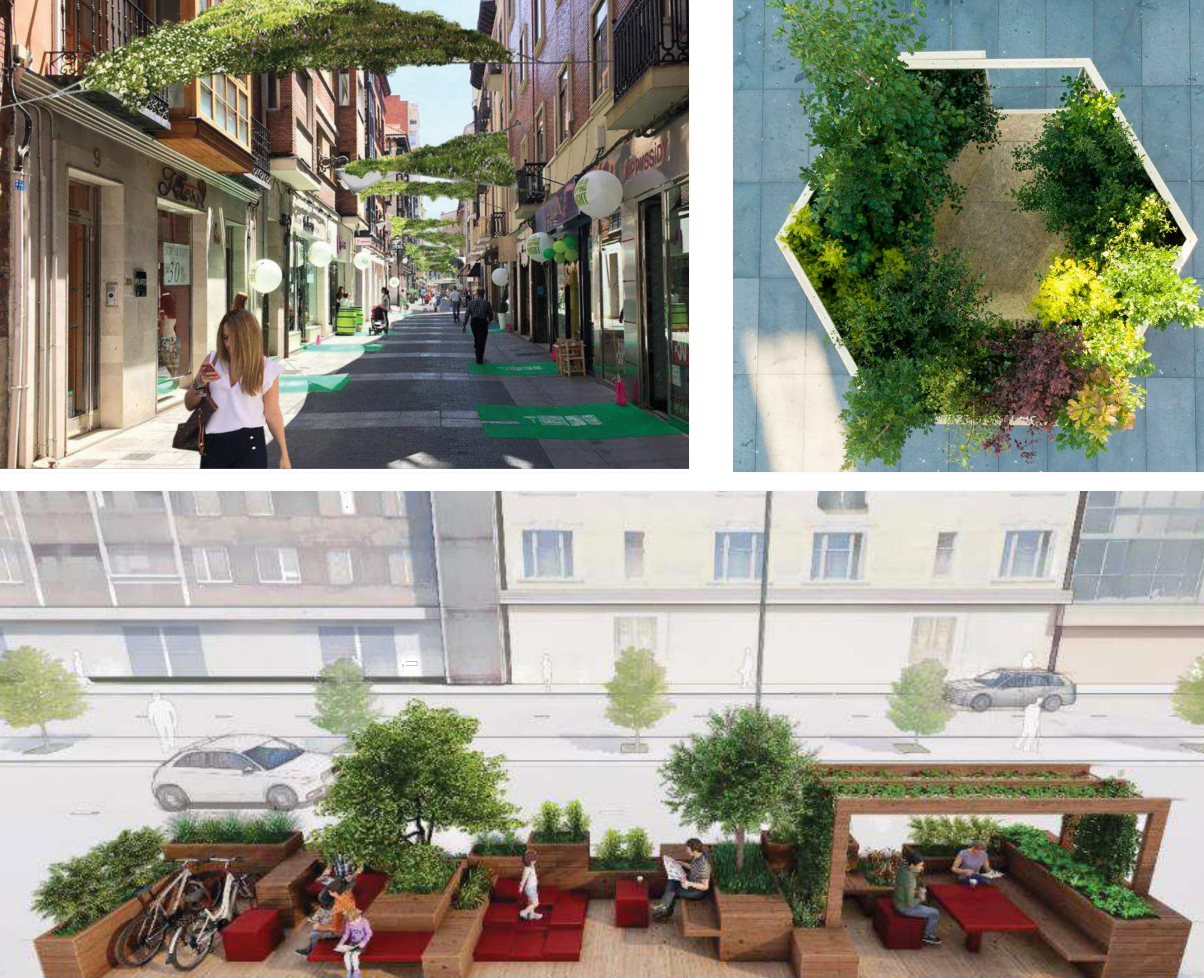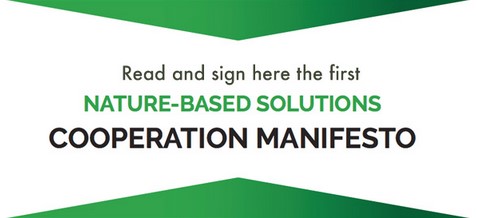The urban fight against climate change through Nature-Based Solutions: The URBAN GreenUP project

DOI reference: 10.1080/13673882.2020.00001062
By Raúl Sánchez Francés, Silvia Gómez Valle and Nuria García Rueda, URBAN GreenUP project
Climate emergency and its effects on cities is one of the most important threats for citizens in this Century. Floods, heat island effect, biodiversity lost, drought, illnesses related to the air – water quality, etc. are the main hazards and impacts derived from climate change in our cities.
Currently, many urban areas are uncomfortable places to live due to air pollution, traffic and industrial noise, violence, climate change-related extreme weather events, absence of nature and lack of public green space and its consequences on outdoor physical activity and social cohesion. The NBS (Nature-Based Solutions) are able to change this situation in a sustainable way. NBS can generate new means for social cohesion needs, which affects positively health and well‐being. NBS are creating a new awareness on urban well-being through connecting citizens and biodiversity in harmony.
People are demanding a new urbanism (bio-urbanism) based on the peaceful coexistence between nature and the human being, NBS will take part of the new urbanistic concept bringing again the nature to urban areas.
URBAN GreenUP project is an EU-funded, which aims to contribute to the natural transformation of our cities through the implementation of nature-based solutions as part of new Urban Plans.

The main objective of URBAN GreenUP is the demonstration of an innovative methodology to re-naturing cities (including the new concept of Re-naturing Urban Planning –RUP-) through NBS interventions, considering new technologies, towards turning cities into bio-cities, improving air quality and water management and increasing their resilience. This transition will allow fighting against climate change impacts. The implementation of many different NBS will provide cities with urban cooling, cleaner air, regulated water supplies and flood protection.
URBAN GreenUP in figures
The project titled New Strategy for Re-naturing Cities through Nature-based solutions (NBS), belongs to the topic SCC02-2016-2017: Demonstrating innovative nature-based solutions in cities. It was started on June 1st, 2017 with a duration of five years. The total budget of the project is 14.8 M€ with an EC contribution of 13.9 M€.
The consortium of URBAN GreenUP has 25 Partners from 9 nationalities (Spanish, English, Turkish, German, Italian, Portuguese, Chinese, Vietnamese, Colombian) and it includes 8 municipalities; 9 RTD entities (6 Technology Centres and 3 Universities); 2 large industries; 3 SMEs; 2 Non-Profit organizations and 1 public body).
The demonstrative actions of the project will be deployed in three front-runner cities:
- Valladolid (Spain)
- Liverpool (UK)
- Ìzmir (Turkey)
These cities will validate and demonstrate the effectiveness of the URBAN GreenUP methodology. Likewise, based on these experiences, there will be five follower cities:
- Mantova (Italy),
- Ludwigsburg (Germany),
- Medellin (Colombia),
- Chengdu (China) and
- Binh Dinh-Quy Nhon (Vietnam).
These cities will set up their own Re-naturing Urban Plans to replicate the URBAN GreenUP strategy and its green economy approach.

As main outcomes and most relevant impacts, the project expects to achieve:
- A new global NBS market, new economic opportunities, products, local green jobs (more than 500 direct jobs).
- To increase awareness of the benefits of re-naturing cities.
- Enhancing stakeholder and citizen participation (processes for co-design, co-development and co-implementation).
- To foster the creation of healthier and greener cities by 2020.
- To increase the international cooperation.
- Enhancing the implementation of EU environmental policies.
- Improving living conditions and biodiversity.
- Improving mobility conditions – green corridors associated with promoting the use of bicycles.
Nature Based Solutions and their advantages
More than 100 types of Nature Based Solutions (“Green Infrastructures” and “Blue Infrastructures”) will be implemented in the three demonstrator cities in order to foster the re-naturing urbanization.
In this sense, the project will implement green routes (green bike pavements and pedestrian routes), arboreal corridors (green areas connections with more than new 5,000 trees of suitable species), pollinator modules, green resting areas and arboreal lines. These NBS will contribute to preserve and increase urban biodiversity and to foster well-being by means of NBS). In the same way, urban forests will be used as a carbon sink to reduce the city’s carbon footprint.

To achieve a sustainable way to manage urban water, it is foreseen to install Sustainable Drainage systems (SUDs), rain gardens, urban catchment forestry (urban drainage techniques) and green pavements (hard drainage and specific filtration properties).
The project will deploy green singular infrastructures such as pollinator modules, vertical and horizontal green infrastructure (green walls, green bus shelters, green roofs and green shading infrastructures) as buffer to address the heat island effect in cities.
Carbon capture solutions (urban forests with species to maximise carbon sequestration), pollutant filters (urban garter bio-filter and green filter areas) green roofs and façades, innovative filter pavements, green noise barriers and smart substrates are solutions that can fix atmospheric pollutants and reduce needs for irrigation and fertilization.

As part of social activities promotion the project will launch some complementary non-technical actions related to urban farming (urban orchards, community compositing, climate-smart greenhouses), NBS educational activities (wood allotments, forest school, educational paths), and city engagement (engagement portal, green art, forest church, sponsoring activities).
Community-supported urban farming with agricultural cooperatives (specifically by women), city coaching (promotion of ecological reasoning and ecological intelligence) and support activities complete the group of nature-based solutions to be implemented thorough the project.
Some investment plans are included and some potential innovative business models have also been pre-identified as a mean to strengthen the project impact and help to create a real ecosystem of business around city re-naturing.
The project has a high R&D component, since all the NBS specific proposals for technological innovation and will monitor with new sensor systems. The project will monitor the impact of the combined solutions in each city and attempt to quantify how much they reduce temperatures, clean air and water or prevent flooding. This will be done through a combination of special sensors, weather monitoring, manual data collection and citizens submitting useful information through apps.
URBAN GreenUP project has promoted the development of NATURE-BASED SOLUTIONS Cooperation Manifesto, which aims to re-naturing cities through the cooperation and support of the European Nature-Based Solutions Projects.

Contacts
Corresponding author and Project Coordinator: Raúl Sánchez, rausan@cartif.es | Silvia Gómez Valle, silgom@cartif.es and Nuria García Rueda, nurgar@cartif.es
Funding information


This project has received funding from the European Union’s Horizon 2020 research and innovation programme under grant agreement No 730426.